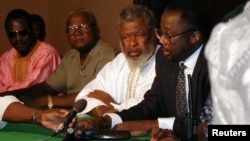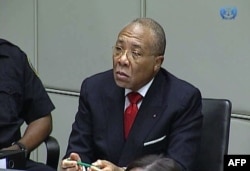DAKAR —
Sierra Leone officials say they have deported a notorious arms dealer and ally of former Liberian President Charles Taylor who was facing criminal charges. But the whereabouts of the suspect, Ibrahim Bah, were unknown on Tuesday, as his native Senegal denied having received him.
Justice Minister Frank Kargbo did not confirm that Ibrahim Bah had been kicked out of the country until late on Monday, the same day a court in Freetown issued a warrant for his arrest.
Kargbo provided no details beyond saying that Bah was destined for Senegal.
Bah faces charges including assault and kidnapping, stemming from a private complaint brought by a man in Sierra Leone's eastern Kono district. The man says Bah threatened to kill him and held him against his will for several days.
The private case was filed after it became clear that Sierra Leonean authorities had no interest in trying Bah, who United Nations experts discovered living in the country earlier this year. His whereabouts were unknown until the experts released their report in May. Bah has been under a U.N. travel ban since 2004.
Ibrahim Tommy, executive director for the Center for Accountability and Rule of Law in Freetown, said Sierra Leonean officials were never enthusiastic about the case and had indicated they would not help out with the private prosecution.
"They have told us from the get-go that they didn’t have the resources, they didn’t have the time to pursue justice on behalf of the victims of Kono district," said Tommy.
Charles Taylor was sentenced to 50 years in prison last year after the U.N.-backed Special Court for Sierra Leone found him guilty of war crimes and crimes against humanity committed during Sierra Leone's civil war.
Although Bah was not charged by that court, he played a critical role in Taylor’s crimes. Judges concluded that he was a “trusted emissary” of Taylor’s who helped arrange arms and diamond transfers with rebels in Sierra Leone.
Human rights groups and other observers argued that a trial of Bah in Sierra Leone would allow the country to showcase how far its judiciary has come since the U.N. tribunal began work in the country.
Instead, Tommy said, the country’s decision to deport Bah showed a failure of the judiciary to support victims of the country’s 11-year conflict, which ended in 2002.
“We would’ve hoped that the government would support our efforts, would support the victims who have brought this matter against Ibrahim Bah," he said. "They have the right to justice. Ibrahim Bah must, we insist, he must have his day in court.”
Human Rights Watch said that with Bah's deportation, Sierra Leone has "taken a real step backward on promoting justice for grave crimes."
Justice Minister Frank Kargbo did not confirm that Ibrahim Bah had been kicked out of the country until late on Monday, the same day a court in Freetown issued a warrant for his arrest.
Kargbo provided no details beyond saying that Bah was destined for Senegal.
Bah faces charges including assault and kidnapping, stemming from a private complaint brought by a man in Sierra Leone's eastern Kono district. The man says Bah threatened to kill him and held him against his will for several days.
The private case was filed after it became clear that Sierra Leonean authorities had no interest in trying Bah, who United Nations experts discovered living in the country earlier this year. His whereabouts were unknown until the experts released their report in May. Bah has been under a U.N. travel ban since 2004.
Ibrahim Tommy, executive director for the Center for Accountability and Rule of Law in Freetown, said Sierra Leonean officials were never enthusiastic about the case and had indicated they would not help out with the private prosecution.
"They have told us from the get-go that they didn’t have the resources, they didn’t have the time to pursue justice on behalf of the victims of Kono district," said Tommy.
Charles Taylor was sentenced to 50 years in prison last year after the U.N.-backed Special Court for Sierra Leone found him guilty of war crimes and crimes against humanity committed during Sierra Leone's civil war.
Although Bah was not charged by that court, he played a critical role in Taylor’s crimes. Judges concluded that he was a “trusted emissary” of Taylor’s who helped arrange arms and diamond transfers with rebels in Sierra Leone.
Human rights groups and other observers argued that a trial of Bah in Sierra Leone would allow the country to showcase how far its judiciary has come since the U.N. tribunal began work in the country.
Instead, Tommy said, the country’s decision to deport Bah showed a failure of the judiciary to support victims of the country’s 11-year conflict, which ended in 2002.
“We would’ve hoped that the government would support our efforts, would support the victims who have brought this matter against Ibrahim Bah," he said. "They have the right to justice. Ibrahim Bah must, we insist, he must have his day in court.”
Human Rights Watch said that with Bah's deportation, Sierra Leone has "taken a real step backward on promoting justice for grave crimes."





